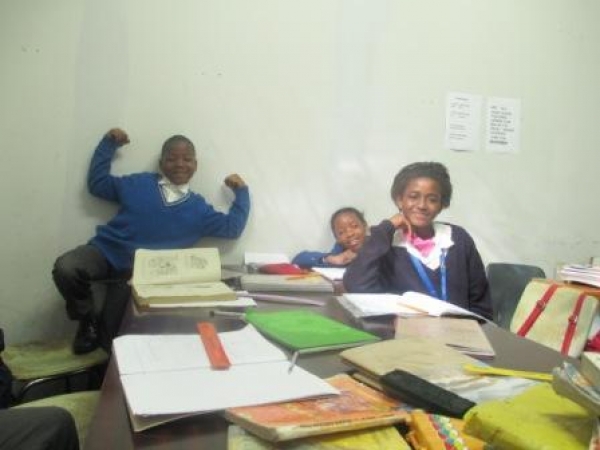Zimbabweans form local study group

Zimbabwean teachers and students sometimes find it hard to integrate to South African schools. Established in January 2014, Par excellence is a study group with teachers and 20 Zimbabwean students located in Salt River. They are mainly high school repeaters and a few primary school children whose parents could not get places for them in major South African schools.
The Founders are Costaine Musora and Morris Mushambadope. Musora holds an Honours Bachelor of Arts (English and Communication) and Mushambadope holds a Bachelor of Science (Mathematics). There are four qualified teachers at the school.
Musora told GroundUp that sometimes qualified teachers from Zimbabwe find it hard to integrate to South African schools. They end up doing any kind of job for survival.
He said, “When I arrived from Zimbabwe, I did general work for a few months before I taught grade 9 to 12 at Stone Fountains College in Athlone and grade 12 at Savanna College School of Computing in Bellville. The school is named Par Excellence because they believe the education they are offering is more than excellent”.
The parents and students who are currently studying at Par Excellence do not want to lose Zimbabwean education. They are wary that when they go back to Zimbabwe, South African matric certificates might limit their opportunities. The belief is that matric is not recognised in Zimbabwe and one must have tertiary education; only then will one be recognized as a professional. Some South Africans must write O levels to meet the tertiary education and employment requirements in Zimbabwe.
Parents noticed that their children’s grades went down when the children started learning in some of the Western Cape schools because of the language barrier, in areas which use Xhosa and Afrikaans as the medium of communication. Some primary learners ended up repeating a grade because when they came to South Africa, the parents had a big challenge getting them school places.
Parents were not happy with the educational policy that says learners should start grade one at seven. Many Zimbabweans want their children to start grade one at six years, so that when they go back to Zimbabwe they will not be behind other children who start grade one at six and finish advanced level by 17.
Musora said, “Parents are commending the school for instilling discipline in learners”.
The study group also operates on Saturdays to accommodate working people.
Musora said, “Our challenge is getting a quieter learning environment with affordable rent. Here the rent is a bit high. We pay R7,000 monthly for two classrooms and an administration office. Getting help is difficult since we are foreigners running a study group and not a school. We share the space with others and sometimes they make a bit of noise.”
Monalisa Chipokore is 14 and doing grade seven. She is a year behind because when she came from Zimbabwe last year in October, her mother could not get a grade seven place for her. She told GroundUp she is happy to be in the study group because she is learning the same curricula she used to learn in Zimbabwe.
She said, “My mother looked for a place at all the schools in Mitchells plain but could not get one”.
Nisha Nyati said, “I stay in Elsies River. My mother looked for a grade seven place for me in Goodwood, Parow, Elsies and all surrounding schools, but they were all full.”
11-year-old Darrell Kugarakuripi from Fish Hoek said her mother transferred him from Star of the Sea Convent Primary School to the study group. He said, “If my mother gets me a place for school, I do not want to go back there anymore. Here we get all the attention; it is one on one learning, and I am enjoying lessons more than when I was in a big class. But I miss sports. I wish there was sporting facilities.”
Primary level learners are doing the following subjects: Mathematics, English, Environmental Science, Economics, Religious studies, History, Shona and social studies. A level subjects include Mathematics, Divinity, English, Literature, Geography, History, Management of Business, Accounting, Biology and Commerce.
Future plans are to develop the study group into a Zimbabwean school in line with South African government requirements, introduce computer lessons, and establish sporting facilities.
Next: What the law says about police using violence
Previous: Shortage of drug that prevents babies from getting HIV

This article is licensed under a Creative Commons Attribution-NoDerivatives 4.0 International License.


